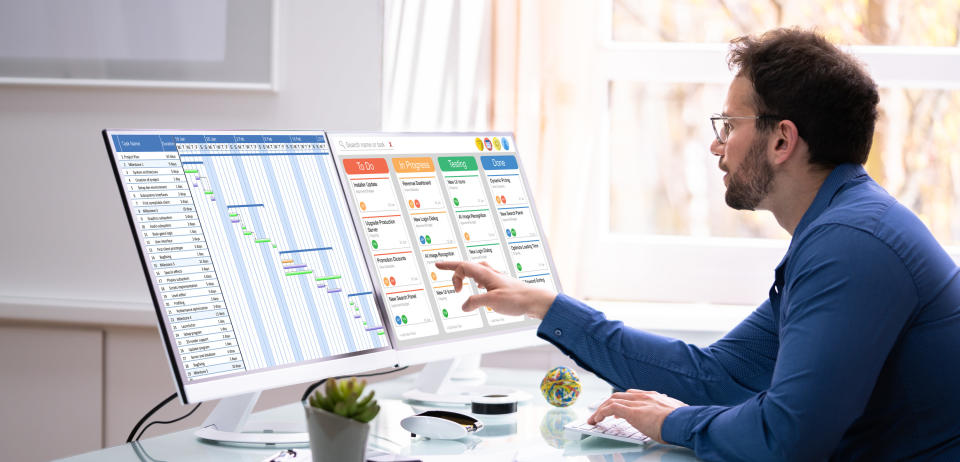I've Been Freelancing For 4 Years And Here Are 19 Things I Think Every Freelancer Should Know
After losing my job in 2018, I went freelance. And it took me about three seconds to get addicted to the freedom it afforded me.
Comedy Central / Via Giphy / giphy.com
I had been working full time for a fully remote media company when I lost my job suddenly. It sucked. But since I had already been writing and editing, shifting to freelance writing and editing felt natural. And it turned out to be one of the best things that ever happened to me.
I loved (and still love) being able to set my own schedule each day and take time off whenever I want. I can go to a museum on a Wednesday to avoid the crowds and catch up on work that evening — or over the weekend.
And while the freedom is great, freelancing can be tricky to navigate — especially at first. Below is what I've learned over the last four years and what Toni Frana, Career Services Manager at FlexJobs, a flexible and remote job search site, recommends:
1.But first off, what exactly is freelancing?

Some people think of freelancing as putting in a couple hours of work every week, but freelancing can also be a full-time job. It also helps to know that freelancers are often called independent contractors, consultants, self-employed people, or even side hustlers.
"At FlexJobs, we define freelancing as any work you do, at any level and in any amount, that is not employee work. It can come in all shapes and sizes, such as working as an independent contractor or consultant, taking on a side hustle, or being self-employed in some capacity," said Frana.
2.Before you start looking for jobs, consider what industries tend to hire a lot of freelancers.

Certain industries are more conducive to freelancing than others, so if you're set on going freelance, you might want to first consider what industries are actively hiring freelancers.
Luckily, this is FlexJobs' area of expertise. Frana cited a recent FlexJobs report that evaluated the number of freelance job postings by industry between January 1 and May 31, 2022. According to their report, these industries have the most remote, freelance job opportunities (listed in order from highest to lowest number of postings):
- Accounting and Finance
- Administrative
- Computer and IT
- HR and Recruiting
- Bookkeeping
- Customer Service
- Writing
- Virtual Admin
- Project Management
- Marketing
3.And what job titles are often freelance.

According to the same FlexJobs report, most of the remote, freelance job postings were under the following job titles (listed in order from highest to lowest number of postings):
- Executive Assistant
- Recruiter
- Customer Service Representative
- Accountant
- Administrative Assistant
- Bookkeeper
- Graphic Designer
- Copywriter
- Social Media Manager
- Project Manager
4.Then, set your rate — but not before you do your homework.
Orion Pictures / Via Giphy/ giphy.com
Setting your rate can be tricky. If you go too low, you'll devalue yourself (and not be able to pay your rent), and if you go too high, you might scare off potential clients.
When I first started freelancing, I took whatever I could get — which is not something I suggest. Now I have a minimum hourly rate. And while most of my work is paid by the project (one flat rate), I keep track of my hours so I don't dip below that minimum hourly rate.
To determine a good rate, Frana suggests, "Talk to other freelancers in your field and people who have hired freelancers to get a better sense of what the going rate is for the job. Once you have a general idea of what freelancers in your field are charging, determine your ideal annual income and what it will take to earn it. Then, we recommend dividing the dollar amount you need to earn per week by 40, which will give you the hourly base rate."
5.Don't forget that as a freelancer your rate will have to cover any time you spend doing administrative things and any added expenses you have.

As a freelancer, you'll likely be in charge of doing your own marketing and billing and will have to buy your own computer, printer, desk, and office supplies, among other things. Your hourly rate does not just need to cover the hours you spend working, but should also cover the time you spend creating invoices and the materials you need to do your job.
"During the price negotiation, mention these expenses and justify your rate by being clear on everything you’re offering to the client," said Frana. "Once a rate has been agreed upon, make sure your contract outlines the specifics, like when payments are due and what happens if the client doesn’t pay."
6.Create a website so clients can review your work and see your qualifications.

In most cases you'll need a website where potential clients can check out your past work and get a feel for what you offer. Think of it as a place where you can introduce yourself and give people a place where they can find everything they need to know about you. It's almost like a living resume.
7.And then...look for your first client.

In my experience, finding a freelance gig is easier than finding a traditional, full-time job. There is less pressure on both you and the company because either of you can decide to opt out at any time (unless, of course, you've signed a contract with a set duration).
When it comes to finding your first freelance gig, Frana suggests checking out freelancing job boards and gig work sites and tapping into your professional network.
8.Once you've found your first gig, keep an eye out for a second, and a third, and a fourth.

Most freelancers have multiple clients (I personally have five), so unless you only have time for one client or you found a full-time freelancing gig, you'll need to keep looking for more work.
Frana suggests asking your clients "to pass your name along to anyone else who might be seeking out your services. It’s a great way to actively market your freelance business, with barely any investment in time or money."
In my experience, the more clients, the better. That way, if one drops off, you can still stay afloat.
9.Keep the clients you like happy and don't be afraid to say goodbye to gigs you don't love. That freedom of choice is what makes freelancing great.
Netflix / Via Giphy / giphy.com
As a freelancer, you'll likely be working with several different people from several different companies — and everyone will have a difference expectation of you.
To start, Frana suggests "asking every client about their expectations on turnaround times, scope of work, and rates. By putting everything on the table before you start working with a client, you’ll avoid potential pitfalls later on, build better loyalty, and be able to successfully foster a client relationship for the long-term."
And finally, if you're not getting paid on time, the people you work with are rude, or you don't like the work you're doing, it's probably not worth sticking around. Unlike a traditional job, where quitting is a big deal, it's super easy to cut clients as a freelancer. There's no need to be miserable.
10.Make sure you sign a contract for every project you take on.

When it comes to freelancing, the water can be murky. The only way to make sure you get paid the correct amount, on time, is to sign a contract.
"It’s essential to establish a contract with every client that you work with. Whether a client skips out on paying you, or the scope of work begins to snowball out of control, having that signed document in your corner will be a tremendous asset," said Frana.
11.You'll need a system for keeping track of what you're owed and when you should be paid.

This is honestly one of the hardest parts of freelancing. Invoicing your clients and making sure you were paid take up more time than you'd imagine. It's essential that you have a solid process in place.
I personally use Trello to keep track of what projects I'm working on, which ones I've invoiced, when payments are due, and when I'm paid. In the past, I've also used Asana and Airtable. You can also just use a series of folders on your desktop. The trick is to find a process that works for you and then keep it well managed so nothing slips through the cracks.
12.And a system for keeping track of the work you've committed to and what your deadlines are.

If you're using Airtable to track your invoicing, you should probably use Airtable to track your projects. Having everything in one place just makes sense.
That said, it's up to you. I actually still use a notebook to keep track of all my assignments and deadlines, but that's mainly out of habit.
13.One of the hardest parts about being a freelancer is figuring out how to structure your day.
Neon / Via Giphy / giphy.com
Two things happen to most newbie freelancers. They either a) don't get any work done because there is a lack of structure and too much distraction or b) work all the time because of that lack of structure.
Over the years, I've found that I operate best when at the end of every work day I outline a plan for the following day. For example, I might plan to spend two hours on one project before shifting to another for the next four hours. I always schedule time for lunch and any other non-work things I have to do that day. You might not stick to the schedule completely, but it helps guide your day and keeps you on track.
14.You'll need to schedule focused work time for each project or client.

If you're constantly hopping from one project to the next and checking emails (and your phone) intermittently, you'll never get any work done. In my experience, it's best to put aside a chunk of time for each project you need to work on that day.
If I put aside a two-hour block of time for a client, I do my best to avoid checking my email, my phone, or letting another project distract me during that time period. I've also used the Pomodoro method in the past. It's the same idea, but it breaks your focused work periods into 25-minute chunks followed by a short break.
15.Set a reminder to ask your clients for pay increases regularly.

I am admittedly horrible at this, but it's something I've been trying to be better at. I set a reminder so each year I can notify my clients that my rates are increasing. It doesn't have to be much, but a little every year can add up. Think of it like your annual raise.
16.Keep track of your income and expenses so you have an idea of how profitable your business is.

You'll need to keep a close eye on your profit and loss so you'll know if you need to raise your rates, take on another client, or cut down on expenses. I use QuickBooks for all this — and I have to say, keeping track of everything there will save you big come tax season. This brings me to my next point.
17.Taxes. Taxes are tough when you're a freelancer. You'll pay different taxes than a regular employee and will have to stay on top of things throughout the year.

There is so much to say on the topic of taxes, which is why I wrote this and this. In brief, you'll need to put aside money from every paycheck so you don't come up short come tax season, and you'll probably need to pay your taxes throughout the year (rather than just at tax season). There are also a lot of things you might be able to write off — from your home office to your computer and gas.
TBH, hiring an accountant may be your best course of action.
18.Be careful not to take on too much work.
Lifetime / Via Giphy / giphy.com
While at first you may be struggling to find work, after some time, you might find that you have too much work. The trick is finding that sweet spot where you're busy and profitable, but not burnt out and overworked.
Frana suggests that freelancers "be realistic on how much work you can accomplish during any given day or week, and learn to say 'no' to projects, as needed."
19.Once you've committed to freelancing, consider setting up an LLC.

In short, an LLC establishes your business as its own legal entity. With that legal entity in place, you won't be personally responsible for the debts or liabilities your "company" incurs, and it protects your personal assets (like your home, car, and money).
"If freelancing is more than casual side work, you may want to consider setting up your business as an LLC," said Frana.

